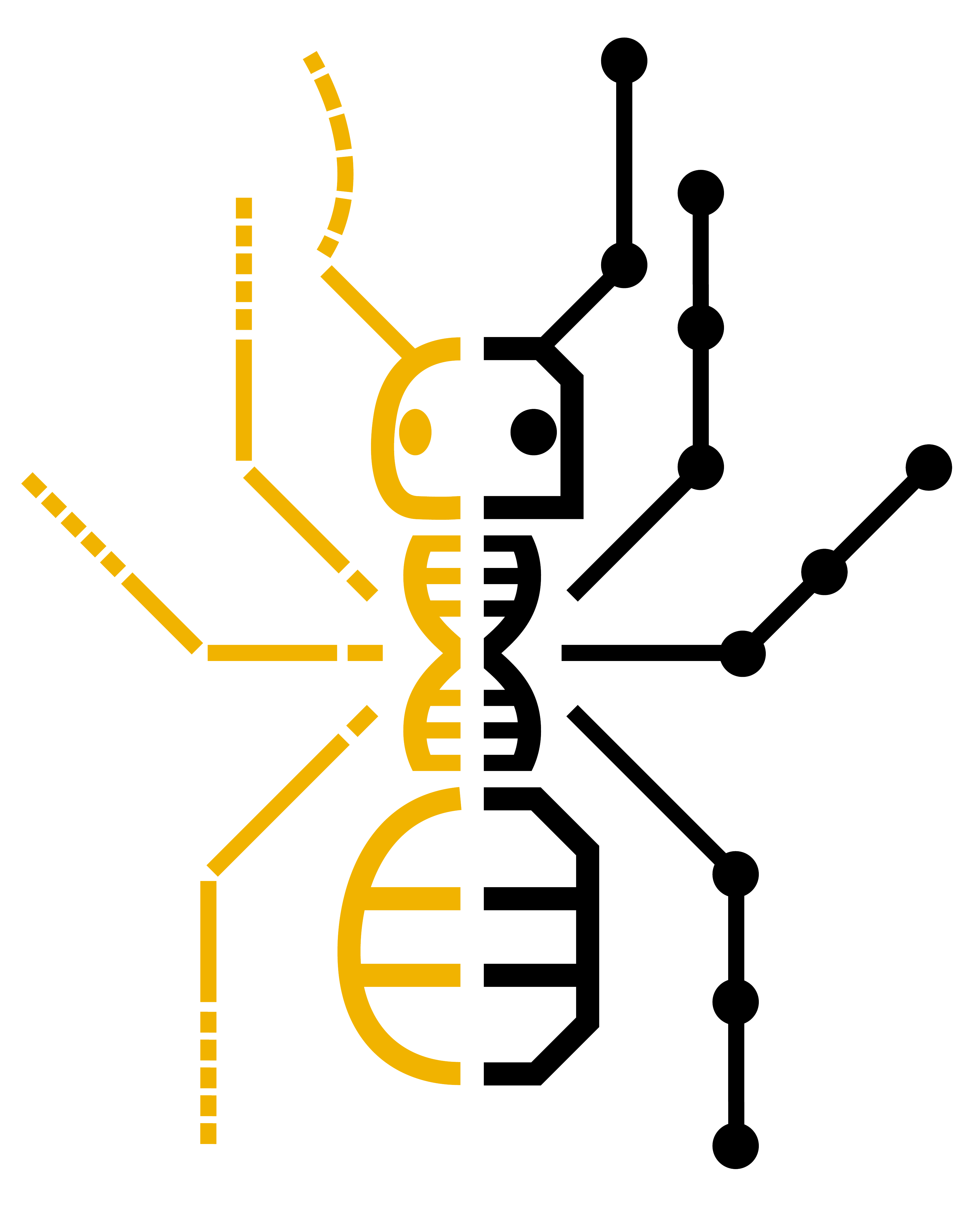

We are a group of biologists at Colorado State University, working in the department of Agricultural Biology and affiliated with the C. P. Gillette Museum of Arthropod Diversity.
We study the biodiversity of insects and other organisms. We are interested in cataloging and description (taxonomy) of biodiversity, as well as processes that created it (speciation, phylogeny). Most of the work in our lab is in these three areas: taxonomy and systematics of insects, bioinformatics, and artificial intelligence.
Our mission is to advance the understanding of biodiversity and the history of life on Earth through rigorous research, development of accessible software, and the training of future scientists. We are committed to fostering a vibrant community of practice by providing empowering training, offering supportive mentorship, and promoting interdisciplinary collaborations.
Prospective students and postdocs, please check out our lab wiki.
Taxonomy and systematics
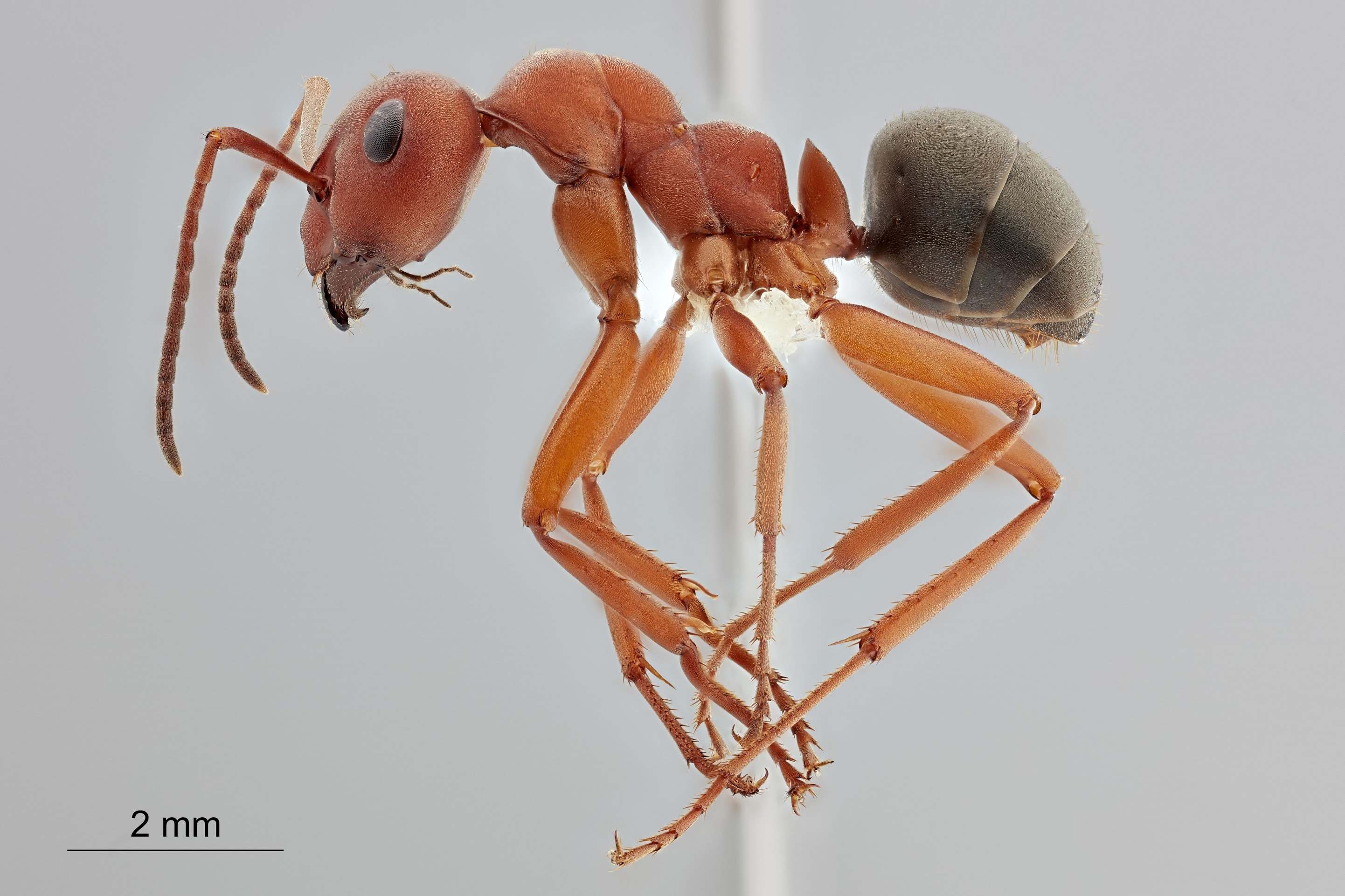
We are interested in taxonomy, species delimitation, and broadly defined systematics of insects. We strive to produce high-quality systematic and phylogenetic studies that allow other researchers to place previously neglected taxa in classification and evolutionary frameworks. Much of the focus is on ants and ongoing projects include species delimitation and phylogenetics of North American Formica and Veromessor ants. We also work on other groups: currently Stephanie Eskew is tackling the systematics of cynipoids.
Bioinformatics

Most modern systematics work involves juggling of large data sets and our lab is interested in writing tools to do it efficiently. Check out AMAS, a tool for manipulation and computing of various statistics on multiple sequence alignments, and Spruceup which offers a distinct take on trimming of poorly aligned sequences. If you are working with ultraconserved elements (UCEs), especially in Hymenoptera or other insects with relatively compact genomes, you may also be interested in a tool for extracting protein-coding sequences from UCE loci.
AI in biology

We also apply developments in the field of machine learning to biological problems. The remarkable successes of neural networks in solving many problems considered intractable by traditional computing, such as speech or facial recognition, promise expert-like automated species identification and better evolutionary inferences from molecular data. We are currently working on AI-assisted identification of insect pests of cereal cropping systems, a tool for identification of North American arthropods from images in general, and demographic model selection using neural networks. Read our review of AI applications in ecology and evolution.
Marek Borowiec (PI)
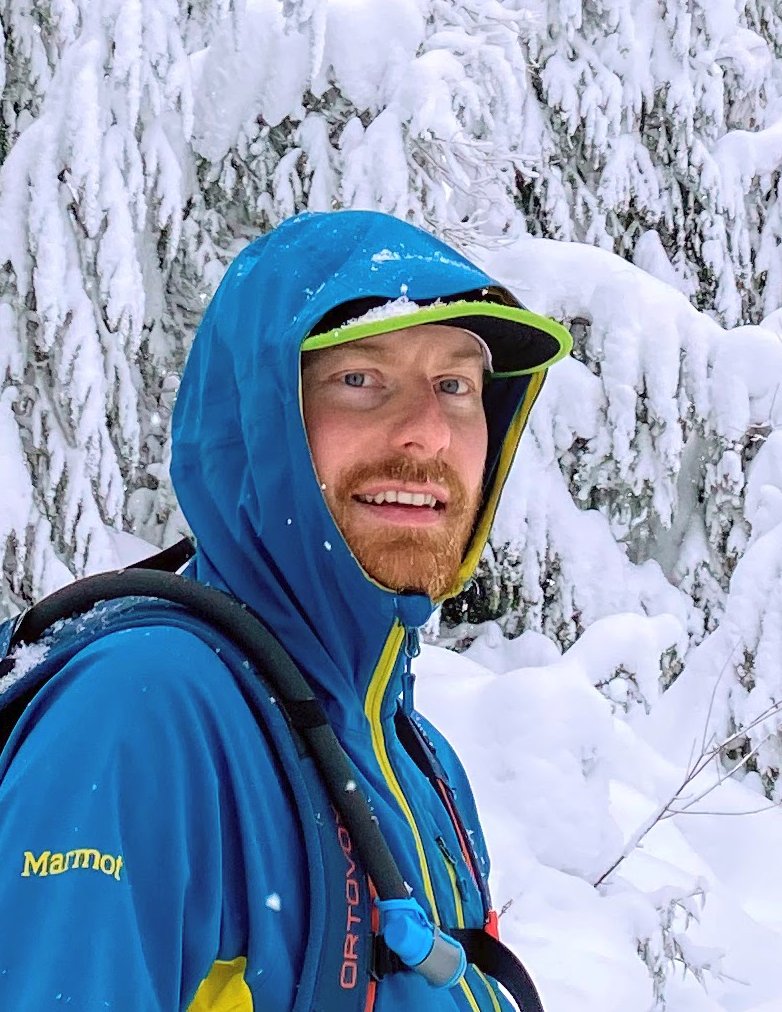
Marek is a biologist interested in biodiversity, including its cataloging and description (taxonomy), and processes that created it (speciation, phylogeny).
In his work he combines field work, systematics, molecular phylogenetics, and computing. He enjoys developing bioinformatic tools and using machine learning to solve difficult problems. When not at the computer or in the lab, you can find him outside searching for ants, hiking, running, or skiing.
Currently Marek is an Assistant Professor at Colorado State University and Director of C. P. Gillette Museum of Arthropod Diversity, based in the Department of Agricultural Biology. He received his PhD from UC Davis in 2016 and he was a postdoc at the Social Insect Research Group at Arizona State University. Prior to joining CSU, he was Assistant Professor at the University of Idaho from 2019 to 2022.
Teaching: Advanced Evolution/Classification of Insects, Applications in Agricultural Biology
Zachary Griebenow (postdoctoral scholar)
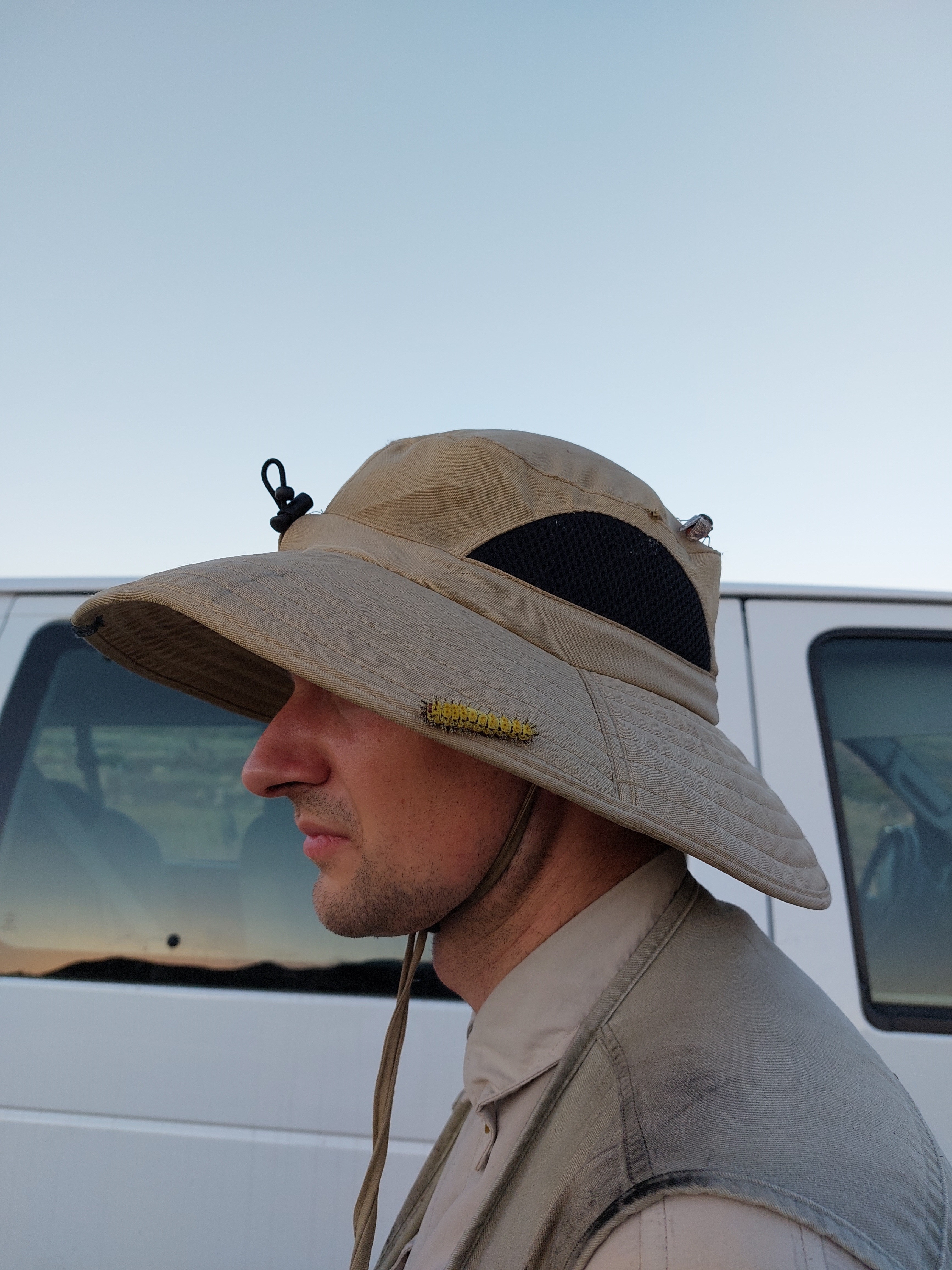
Zach joined the lab in October 2023.
Zach considers himself foremost to be a systematic entomologist, with interest in all information and techniques that support the understanding of insect evolution. His research integrates molecular and morphological data, contextualized by phylogeny, with the aim of delimiting higher taxa that are both consistently diagnosable and reciprocally monophyletic.
He grew up in rural Kentucky, earning a BSc in Entomology at The Ohio State University (2017). This was followed by a PhD at the University of California, Davis under Phil Ward (2023). He spends his spare time writing, reading, and occasionally watching odd or peculiar visual media with his partner and friends.
Vilas Brown (PhD student)
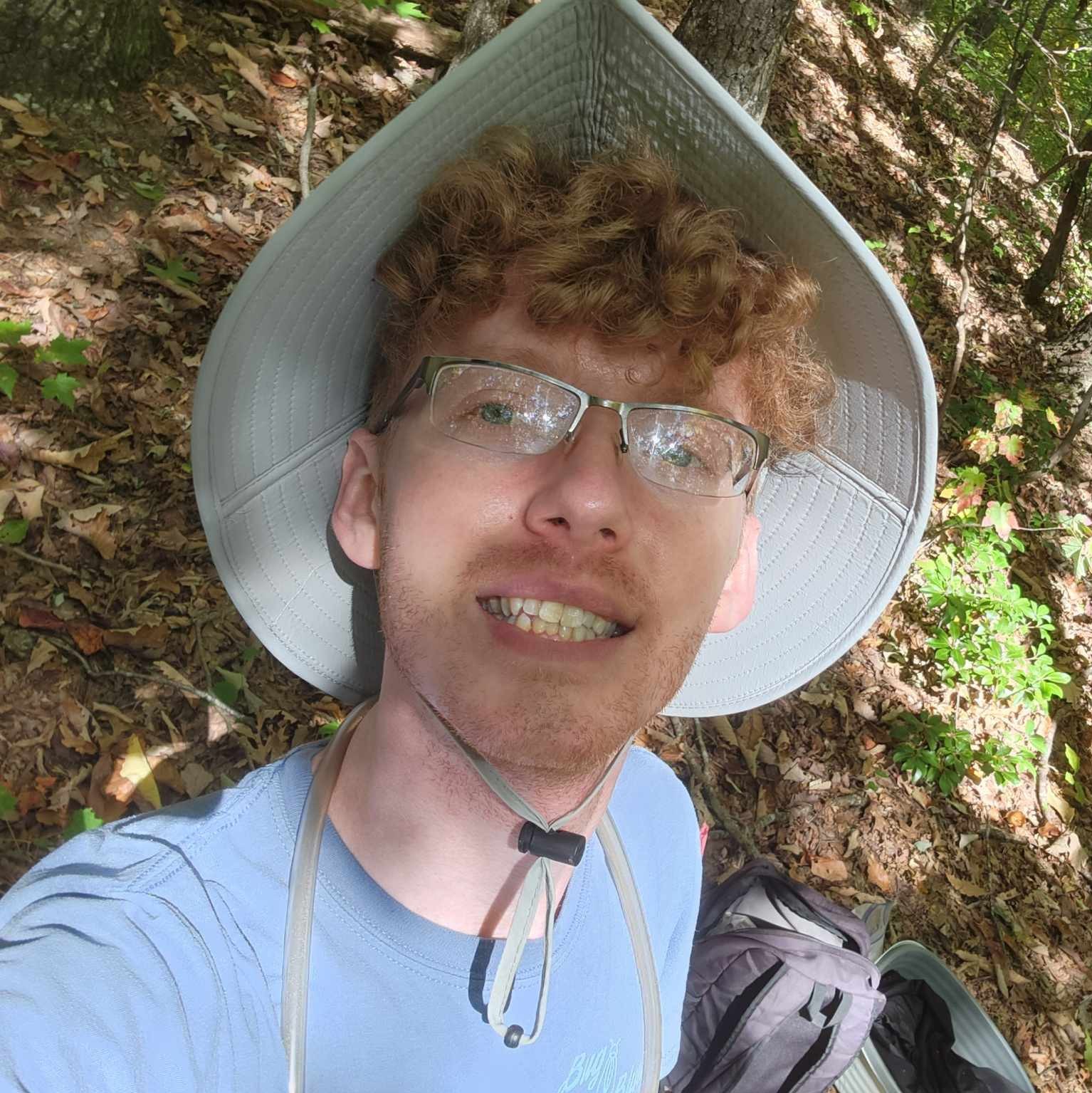
Vilas joined the lab in the fall of 2023.
Their research focuses on the systematics and ecology of a cryptic ant genus, Stenamma, in the Nearctic.
A native to Oklahoma, Vilas has lived in a few places across the United States. From obtaining a MS in 2023 in Agricultural Life Sciences from Mississippi State University, a BS in Biological Sciences from the University of California, Santa Barbara, and an AS in Biological Sciences from Moorpark College. Vilas has worked in museum spaces for several years, starting as an undergraduate student and throughout their masters. They love museums and advocate for insects wherever they can. When not working on graduate work, they like to play video games, create art, read, and spending time with their friends.
Stephanie Eskew (PhD student)

Stephanie joined the lab in January of 2021.
Her dissertation research focuses on the systematics and ecology of gall wasps and their associated inquilines.
Born and raised in Illinois, she received her MS in Biological Sciences from Eastern Illinois University and a BS in Biology from the University of Illinois at Springfield where she studied the ecology of nectar-producing galls. Stephanie has a passion for the importance of natural history collections and curation of insect specimens. When she is not playing with bugs, she enjoys camping, fishing, cooking/baking, puzzles of all kinds, and spending quality time with her husband and their cats.
Leo Liu (MS student)

Leo joined the lab in 2023. He is interested in all things arthropod and exceptionally talented at making insect-themed art and on-line content.
Originally from China, Leo graduated from CSU and is now pursuing a non-thesis masters degree. He is compiling a checklist of aquatic Hemiptera of Colorado along with a visual guide to genera.
Andrea Noble-Stuen (lab manager)

Andrea joined the lab in Fall 2020 and is loving the variety of working here, from molecular lab techniques to data management to macro photography and teaching and supporting others. She continues her work in Idaho supporting the lab of Dr Chris Hamilton.
She received her MS in Natural Resources from the University of Idaho, and a BA in Environmental Biology and Fine Arts from University of Colorado. She managed the daily work in a limnology (freshwater ecology) lab in Colorado, and brings experience from work in analytical chemistry, tree physiology, soils, fish ecology, and forestry. She is now thoroughly enjoying exploring arthropods and DNA.
Alex McKeeken (MS student)

Alex joined the lab in 2019 and excels in many bioinformatics skills including tool development, data management, database design, computer vision and machine learning.
His research involves combining deep learning with citizen science databases to design machine learning models capable of identifying thousands of North American arthropods genera from photographs. He hopes his work can be used by the public and academia and be a first step towards changing how arthropod identification is done.
Originally from Idaho, Alex received his BS in Medical Sciences from University of Idaho and is currently working on MS in Bioinformatics and Computational Biology. He is now pursuing a PhD in cancer genomics at the University of Minnesota.
Heide Keeble (student research fellow)
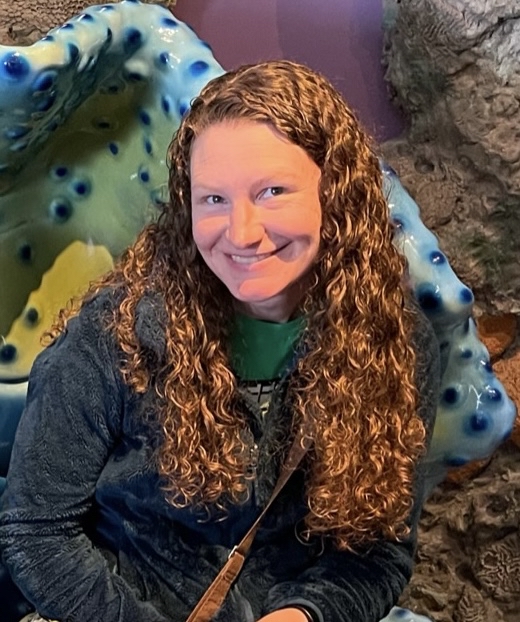
Heide joined the lab in spring 2023, through an Agricultural Biology Undergraduate Research Fellowship. She is majoring in agricultural biology with a concentration in entomology.
Heide was born and raised in northern California, and received her associate degree from the Santa Rosa Junior College, where she majored in botany. She spent many years leading wildflower hikes at the Pepperwood Preserve in Sonoma County, where she was also certified as a naturalist by the University of California in 2019. In 2021 her husband's company asked them to relocate to Colorado and she agreed, on the stipulation that she could go back to school. Since arriving in Colorado, she has volunteered for the Butterfly Pavilion, the Colorado Butterfly Monitoring Network, and the Colorado Pika Project. When Heide is not looking for flora and fauna in her yard, she enjoys hiking, gardening, baking, arts and crafts, (including making Halloween costumes for her daughter), and spending time with her husband, daughter, and their dog.
Mickey Paletta (independent study)

Mickey is a senior at Colorado State University, originally from Westchester County, New York, majoring in natural resources management with a minor in entomology. His academic focus revolves around ecosystem sustainability, conservation, and education, with a specific interest in the preservation of pollinators. Recently, Mickey has been involved in the classification and identification of Lepidopteran species at the CP Gillette Museum. Additionally, he has contributed to bumble bee research with the Forest and Rangeland Stewardship Department, supporting graduate students in their work. During his free time, he actively participates in citizen science projects and pursues passion for outdoor activities such as backpacking, climbing, birding, photography, and more. During the summer of 2022, Mickey began volunteer work at the Museum, focusing on handling groups of moths and bees. He has contributed to the data basing efforts for both the Montana Moth Project and the iDigBees project through the SCAN Portal. Building on this experience, he extended his involvement by participating in a pollinator BioBlitz with the museum in Glacier National Park. Currently, he is engaged in an independent study, delving into the intricacies of moth diversity and abundance.
We are moving! (August 30)
The lab is moving to Colorado State University where Marek will serve as the next director of the C. P. Gillette Museum of Arthropod Diversity. We will be relocating to Fort Collins in October.
Alex graduates (May 14)
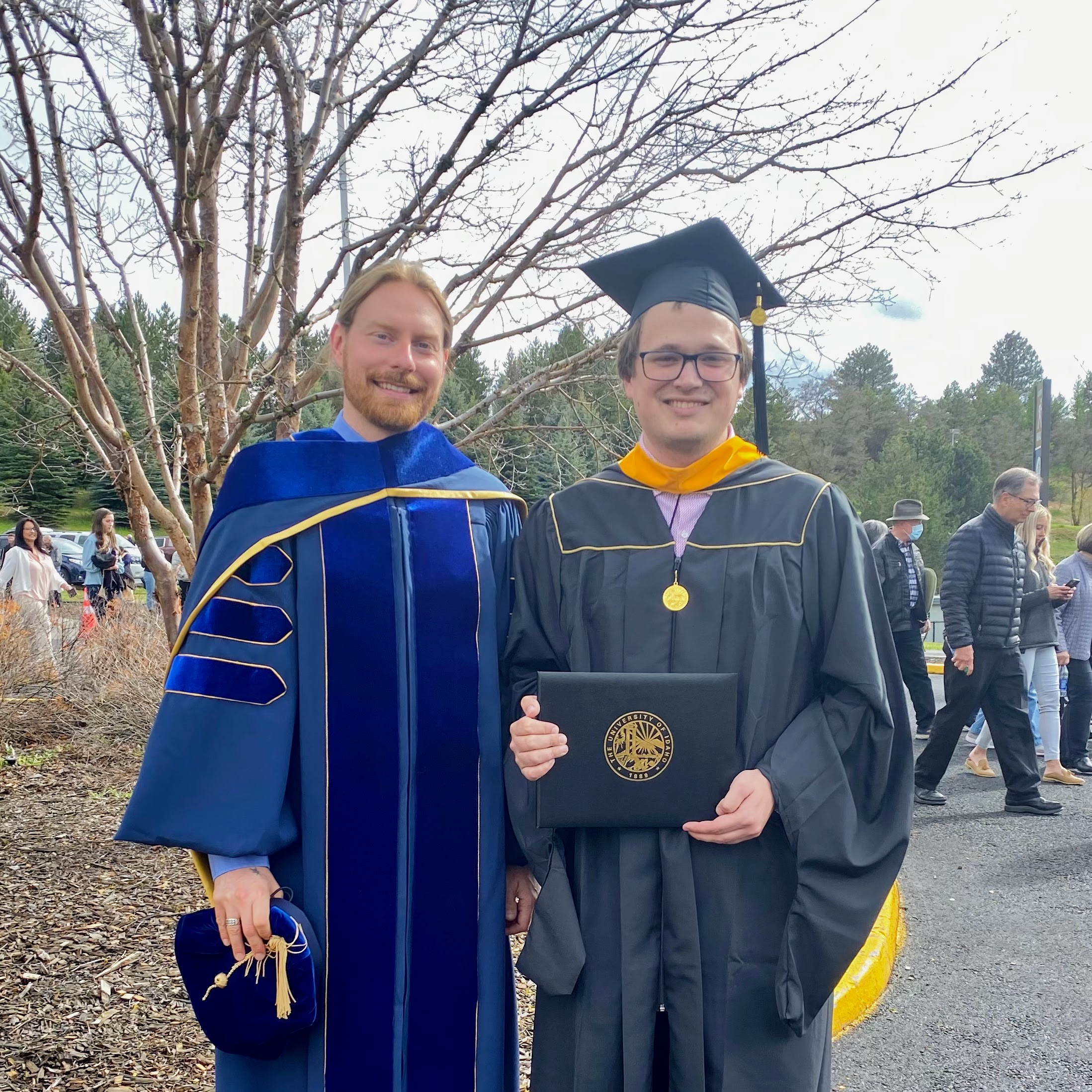
We were proud to walk at Alex's commencement. He graduated with a master's in Bioinformatics and Computational Biology and is leaving for a PhD program at the University of Minnesota where he will work on cancer genomics. Go Alex! The lab group will miss you.
Stephanie receives award (May 5)
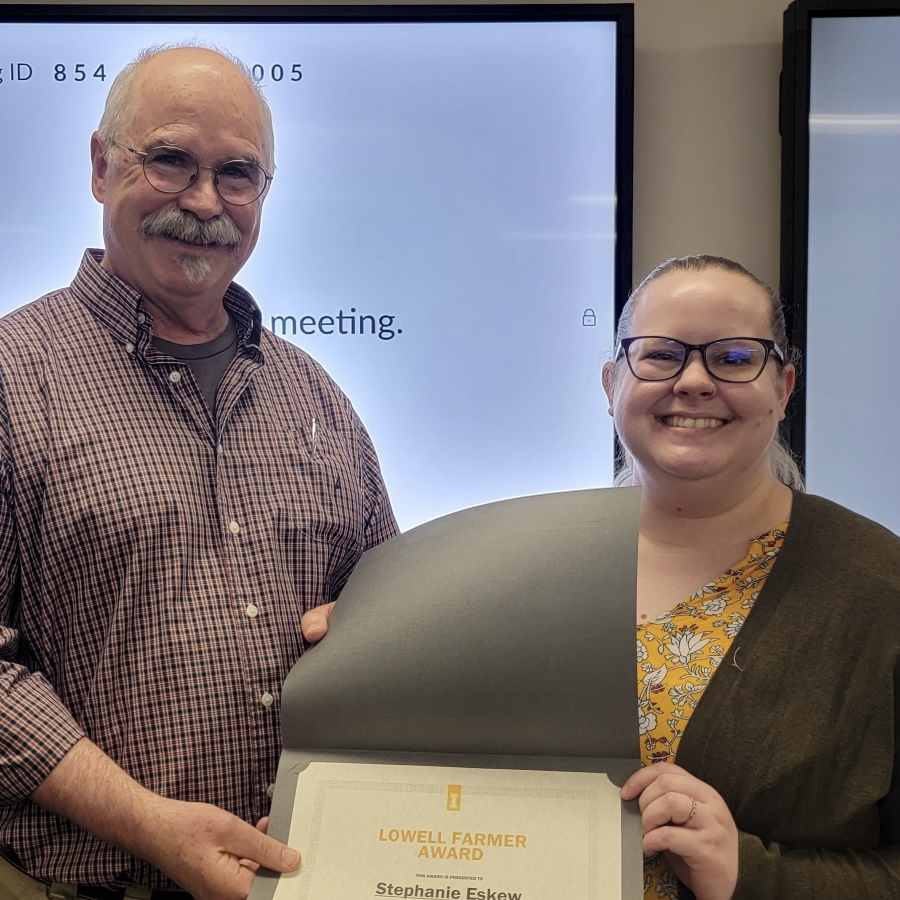
We are happy to share that Stephanie received one of the four Farmer Awards from our department (seen in the photo with our dept head, Ed Lewis). The award is possible thanks to a generous endowment that benefits student research in entomology. She will be able to use the $1,500 award for her work on gall wasps. Congratulations Stephanie!
2022
2021
2020
2019
2018
2016
2015
2014
2013
2012
2011
2010
2009
2007
2005